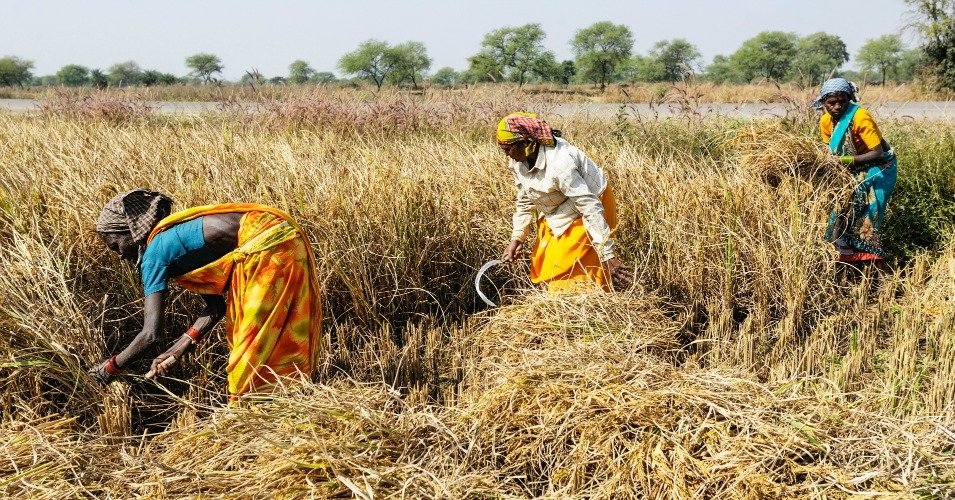US/India WTO Agreement: How Corporate Greed Trumps Needs of World's Poor And Hungry
By Andrea Germanos
14 November, 2014
Commondreams.org

Farmers harvesting in India. (Photo: Asian Development Bank/Rakesh Sahai/flickr/cc)
The United States cheered on Thursday an agreement it reached with India as progress for the World Trade Organization (WTO). Critics, however, say deal is likely a win for corporations and economic loss for developing countries.
A fact sheet from the U.S. Trade Representative explains that there are two parts to the deal that broke what had been an impasse over agreements from Ministerial meeting last year in Bali. The first is that the two countries stated they would move forward on the Trade Facilitation Agreement (TFA)—the WTO's first multilateral trade agreement of the body's two-decade existence. The second is an agreement on India's food security program, which allows for domestic "food stockpiling."
Begging WTO for Food Security
As the Associated Press summed up: "India had insisted on its right to subsidize grains under a national policy to support hundreds of millions of impoverished farmers and provide food security amid high inflation."
Regarding that food security program, the New York Times reports, "Indian and American officials agreed to a peace clause that protects India’s program from a legal challenge until W.T.O. members reach a permanent resolution of the dispute." India had held out on this issue.
But as the Transnational Institute (TNI) pointed out in a report released this week: "The big question is why do governments even need the WTO to decide whether they can guarantee the right to food to their people? The right to food is a universal human right that should not be subject to trade rules."
The report also notes that the need for such a peace clause highlights the "deep hypocrisy embedded within the WTO," as the EU and the U.S., unlike India and other developing countries, are able to pour billions into their own agricultural subsidies.
Deborah James, Director of International Programs at the Center for Economic and Policy Research, echoed these points, explaining to Common Dreams: "The entire debate is outrageous."
"The world has passed through multiple food crises since the WTO rules were written, and nearly every global agricultural agency now recognizes the dire need for developing countries to invest in agricultural production to promote food security, rather than relying on a global market rife with rich countries’ trade-distorting subsidies and speculative distortions. And due to a mass Right to Food movement, India now has a food security program that has been hailed as the most ambitious in the world," James stated.
"It is beyond shameful that the United States blocked these negotiations all year in 2013, and that India and other developing countries were left with a peace clause as a consolation prize," she continued.
Yet, according to Timothy A. Wise, who directs the Research and Policy Program at Tufts University's Global Development and Environment Institute, that India and the U.S. were able to reach an agreement on this issue could be positive.
"India was under enormous pressure to settle this, and its allies were under pressure to abandon India. The good news is that India's firm stance exacted some concessions from the United States that may lead to good-faith negotiations on the food security issues. Time will tell," Wise explained to Common Dreams.
The TFA as Corporate Win
The agreement also moves forward the WTO’s TFA, which is also problematic, critics charge.
As CEPR's James wrote in July:
The new agreement on "Trade Facilitation" would set binding rules on customs procedures and trade operations that would demand huge investments from developing countries and Least Developed Countries (LDCs) to modernize and streamline - according to U.S. and EU standards -- their port operations. This means that while we still don't have binding international rules on, say, the right to water, corporations would have the "right" to have their products exported into developing countries quickly, easily, and cheaply. That's why nearly 200 organizations around the world opposed the agreement when it was being negotiated last year.
The TFA would also divert limited resources away from priority development needs such as health, education, and domestic infrastructure investments in LDCs and developing countries. Developed countries refused to make binding commitments on financial support during the negotiations. The World Bank announced on July 17 that it would make available, through its Trade Facilitation Support Program (supported by Australia, the EU, the U.S., Canada, Norway and Switzerland) an embarrassingly paltry $30 million for over 100 developing countries to assist them in implementing the TFA.
As TNI's new report puts bluntly, the TFA is a win for transnational corporations. As they "control the global supply chains across the world, [they] will gain the most from an Agreement that slashes costs and relaxes customs procedures, easing the flow of imports and exports," the report states.
While the WTO had touted the economic gains of the Bali deal, Wise stated: "The bad news is that trade facilitation remains a largely unfunded mandate that will not produce the laughable estimate of $1 trillion in economic gains for the world, as my colleague Jeronim Capaldo has shown. And it may well create economic losses for some least developed countries."
The WTO said Friday that the U.S./India agreement will probably be implemented by the full 160-member body within two weeks.
This work is licensed under a Creative Commons Attribution-Share Alike 3.0 License
Comments are moderated

